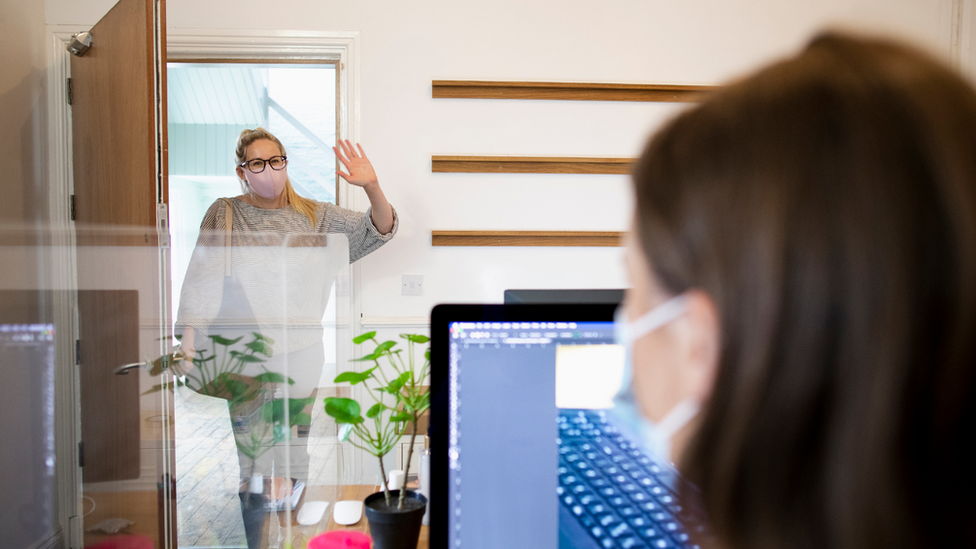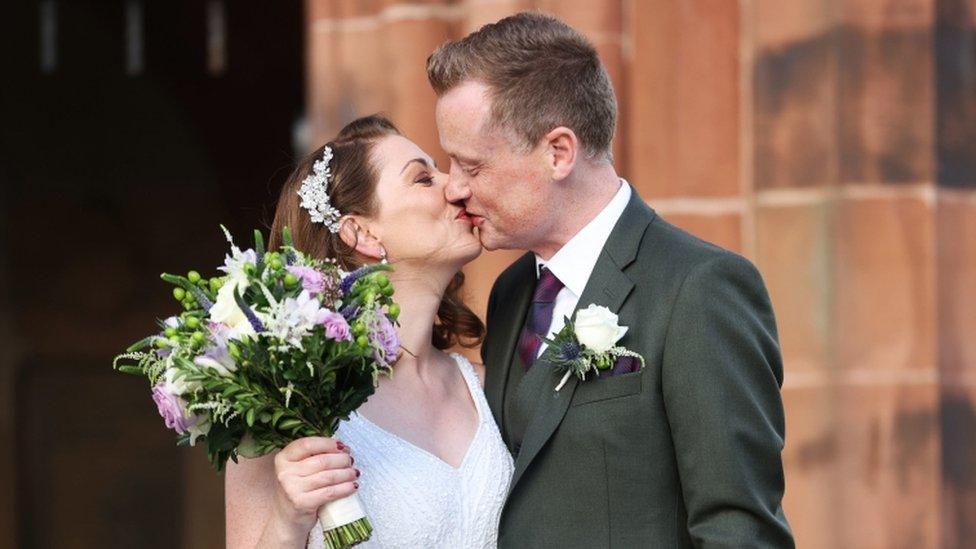Covid in Scotland: New face covering rules come into force
- Published
- comments

Face masks are now required in workplace areas such as canteens, with the rules set to extend to corridors
Face coverings must now be worn in workplace canteens in Scotland under new rules that have come into force.
Other communal workplace areas such as corridors will also be included in the restrictions from Monday.
But the rules on wearing face coverings at wedding and civil partnership ceremonies have been relaxed slightly.
It means the couple will no longer have to cover their faces during the ceremony so long as they are at least 2m away from everyone else.
Face coverings were already required in a number of public settings in Scotland, such as shops and on public transport.
They must also be worn in secondary schools by adults and all pupils in areas such as corridors and communal areas where physical distancing is difficult to maintain.
There are exemptions from all of the rules for young children and people with certain health conditions.
The new workplace restrictions mean that everyone must cover their face in work canteens unless they are sitting at a table - similar to the rules for cafes - and in most other communal areas.
The measures were announced on Thursday by First Minister Nicola Sturgeon, who said they were needed as part of the response to an increase in the number of cases and deaths across the country in recent weeks.
Ms Sturgeon said the country was in a "precarious" position and facing a "critical moment" in the battle to contain the virus, with "tough decisions" needed from government.
A further 1,196 cases of the virus were recorded on Friday, bringing the total number since the pandemic began to 45,232.
The number of people in hospital with the virus has increased by 27 to 629 since Thursday, with 58 patients being treated in intensive care - an increase of six.
The deaths of nine more people who died after testing positive for Covid-19 have also been registered, bringing the total under that measure to 2,594.
Pubs and restaurants across the central belt of Scotland have been closed until at least 26 October, with tough restrictions placed on licensed premises elsewhere in the country.
And strict rules on household mixing that were introduced three weeks ago mean that people are generally not allowed to visit other homes.

Couples who are getting married or entering civil partnerships no longer need to cover their faces during the ceremony
Ms Sturgeon has said that these measures - particularly the most recent ones for pubs and restaurants - will not yet be having an impact on the number of cases of the virus that are being detected.
She has also warned that tougher measures may have to be introduced in the future, and that the country will not return to normal when the current restrictions on licensed premises expire on 26 October.
The Scottish government intends to introduce a tiered system of restrictions at that point, similar to the one that came into force in England earlier this week.
It will include plans to "strengthen and improve the effectiveness" of existing measures, and to improve compliance with the rules - particularly around self-isolation.
The English system has been highly controversial, with Greater Manchester mayor Andy Burnham threatening to "stand firm" against plans to move it into the highest Tier 3 category of restrictions.
Mr Burnham has described the tiered strategy as being "flawed" and "unfair", and has called for greater financial support to be given by the UK government to people affected by tougher rules.
However, neighbouring Lancashire has agreed a deal to enter Tier 3, the BBC has been told.
An official announcement on the new measures is expected later.
It will become the second part of England, after the Liverpool City Region, to go into Tier 3.

